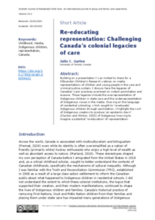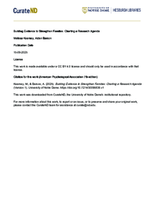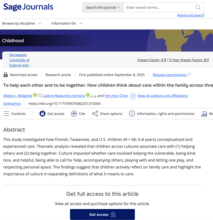Displaying 11 - 20 of 2509
This scoping review examined the scientific literature on youth aging out of substitute care in Canada to address challenges in estimating the country’s contribution to this growing global research field. The review identified key trends, research gaps, and future directions, emphasizing the need to better integrate existing findings to build a more cohesive Canadian evidence base.
The article reports that President Trump secured $25 million in federal funding to strengthen support for youth in foster care, particularly focusing on those aging out of the system who often face heightened risks of homelessness, unemployment, a
Building on a presentation invited for a Kilbrandon Children’s Research webinar on media representations of children and young people in the care and criminal justice system, this article discusses the legacies of Canadian ‘care’ practices premised on violent assimilation and erasure.
This article from BBC discusses how a number of individuals adopted as children into the United States are now at risk of deportation because their citizenship status was never formally secured.
The piece argues that while the U.S.
This Reuters article reports that the Trump administration is offering unaccompanied migrant children in U.S. custody a one-time stipend of US $2,500 to voluntarily return to their countries of origin.
This Washington Post article focuses on how ICE officers are ramping up arrests in the United States, leaving hundreds of migrant children to be sent to federal shelters.
This paper outlines a research agenda to guide the initial stages of work of the new Notre Dame Strengthening Families (NDSF) Research Initiative in the U.S. This initiative is focused on building knowledge around the economics of families and evidence-based ways to promote and strengthen healthy families.
This study investigated how Finnish, Taiwanese, and U.S. children conceptualized and experienced care.
This article notes how a U.S. federal judge has temporarily blocked the Trump administration from deporting dozens of unaccompanied Guatemalan children, following reports they had been placed on planes for return under a new pilot program.



